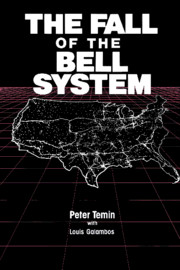Book contents
6 - Reaching agreement
Published online by Cambridge University Press: 06 January 2010
Summary
Administration infighting
The new Reagan administration finally announced the appointment of William Baxter as Assistant Attorney General for Antitrust in February 1981. Baxter, an intense and extremely bright Stanford law professor, was a man of very decided views. His ideology blended two parts of neoclassical economics with one part of law, and he was committed to implementing that ideology as only a true believer can be. He was (and is today) absolutely convinced of the wisdom of his actions. He has never seen the need to look back.
Baxter's conservative outlook on regulation, which he distrusted, and competition, which he applauded, produced an easy fit with the new administration. But although he had frequently expressed his opinions on the telecommunications industry over the previous decade (starting with his appearance with Trienens in 1970), he and the Reagan appointment team apparently did not discuss the AT&T case in any detail before he was selected. AT&T, of course, was fully aware of Baxter's philosophy and deeply concerned when word leaked out that he might be the appointee. Brown contacted Edwin Meese, President Reagan's chief domestic advisor, and told him about Baxter's views. Brown quoted a 1977 speech by Baxter commending the Justice Department for bringing the case. But Brown's intervention failed, and the administration went ahead with the appointment.
Like many senior members of the new administration, Baxter had to move from the West Coast to the East Coast. He eased into Washington slowly, coming in for a few days during February while he finished his teaching at Stanford.
- Type
- Chapter
- Information
- The Fall of the Bell SystemA Study in Prices and Politics, pp. 217 - 276Publisher: Cambridge University PressPrint publication year: 1987



